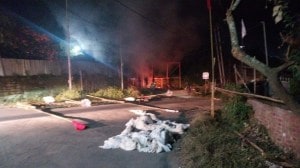Will clean Yamuna, restore river’s health in three years: Delhi govt
“Delhi uses 1,200 MGD of water everyday, of which only 950 MGD gets treated before being released into the Yamuna. For the deficit of 250 MGD, we have floated tenders to build more sewage treatment plants,” Parvesh Singh said.
 “Delhi uses 1,200 MGD of water everyday, of which only 950 MGD gets treated before being released into the Yamuna. For the deficit of 250 MGD, we have floated tenders to build more sewage treatment plants,” Delhi Cabinet Minister Parvesh Singh Sahib said.
“Delhi uses 1,200 MGD of water everyday, of which only 950 MGD gets treated before being released into the Yamuna. For the deficit of 250 MGD, we have floated tenders to build more sewage treatment plants,” Delhi Cabinet Minister Parvesh Singh Sahib said.The BJP-led government in Delhi aims to clean the Yamuna so that the river reaches its original form, in the next three years, Delhi Cabinet Minister Parvesh Singh Sahib said on Thursday at a national conference on ‘Restoring River Health — Yamuna as a Model System’, held in collaboration with Delhi University Botany department’s ‘Nature Care Initiative’.
“Delhi uses 1,200 MGD of water everyday, of which only 950 MGD gets treated before being released into the Yamuna. For the deficit of 250 MGD, we have floated tenders to build more sewage treatment plants,” Singh said.
He, however, said the poor sewage connection in the city is the primary reason behind the pollution in Yamuna. “Delhi is very unplanned, with 70% of its population living in unauthorised colonies with no sewage pipelines. Also, industries sometimes don’t follow the norms,” he said, adding that Delhi Pollution Control Committee and the Delhi Jal Board have been tasked to be more vigilant. The minister said that 13 tenders have been already floated and four more will be floated next month to build sewage treatment plants.
Taking a dig at the previous government led by the Aam Aadmi Party, Singh said that the river will now be cleaned since the Bharatiya Janata Party is at all levels – Centre, state, and the Municipal Corporation of Delhi.
He added that the government has already designed a ‘drainage master plan’ of 50 years which will be public by next week, while a water plan is underway.
At the conference, the minister also mentioned a second river, which flows through the Capital — Sahibi, also known as Najafgarh drain — which he said the government plans to clean as well.
Professor Dinabandhu Sahoo, the Head of Department of DU’s Botany department, meanwhile, laid stress on how people are heavily dependent on the Yamuna, but still treat it badly. “Our research proved the presence of heavy metal and microplastics in the water. When anything is free, people take it for granted,” he said during a session of the conference, adding that this problem persists across India.
Sahoo also displayed a picture of Yamuna flowing alongside the Red Fort during the Mughal era — there is a concrete road now, which is clear encroachment of the river space. “As a result of this issue, we have seen rivers changing their directions after some time, reclaiming their spaces,” he said, also highlighting that strong political will and collaboration are needed to clean the river.
Dean of colleges, University of Delhi, Professor Balram Pani; Registrar Dr Vikas Gupta; President of Nature Care Initiative, Srikant Sekhar; students and other faculty members were present at Thursday’s conference.
The participants will visit the Yamuna on Friday.








